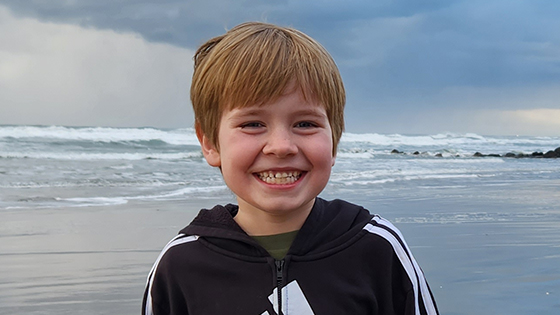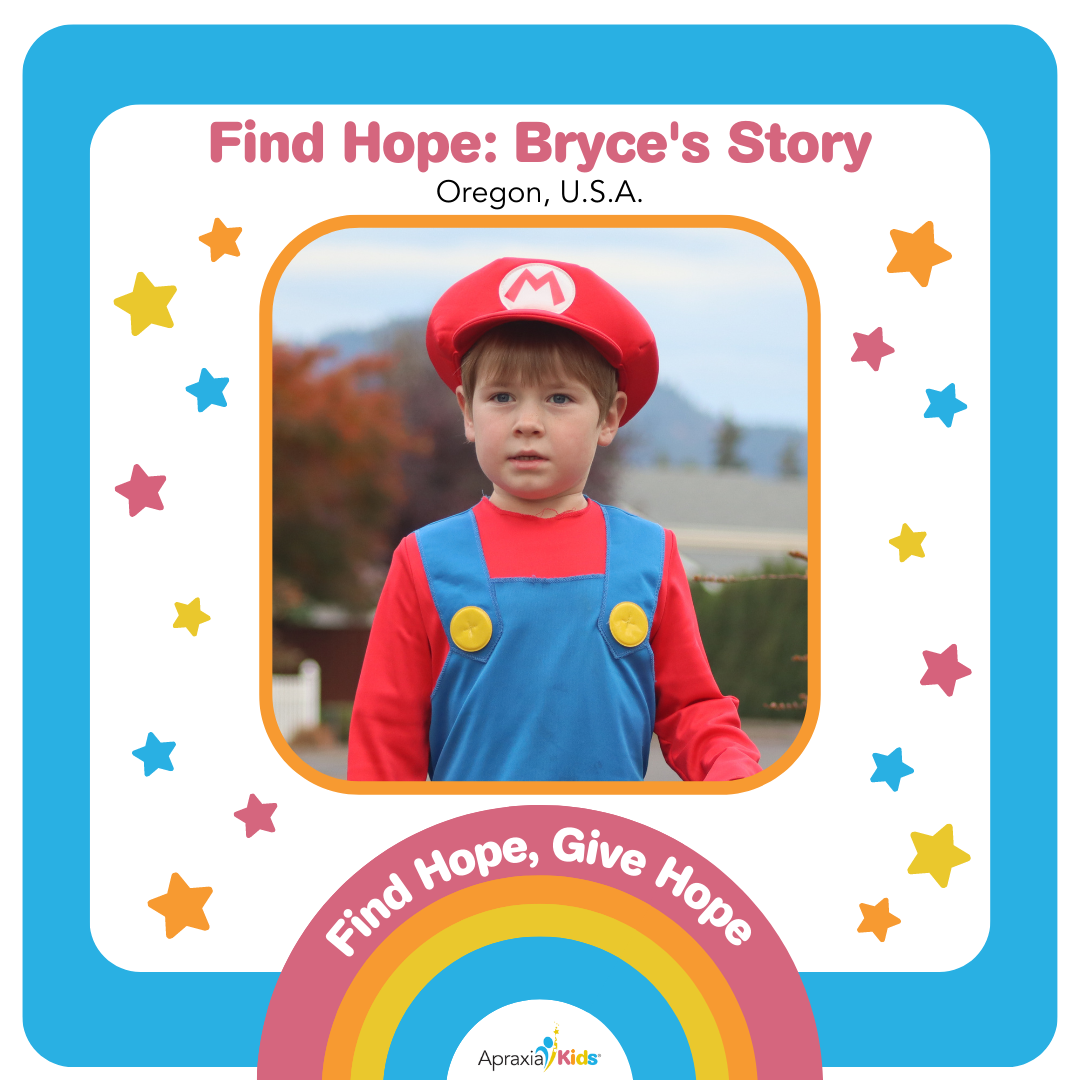
15 May Bryce’s Apraxia Story & Mini-Documentary

Apraxia Diagnosis: Bryce met all the early milestones for speaking his first year. By 18 months, he hadn’t progressed as much as we would have expected. We had him evaluated by his primary care doctor as well as local organizations specializing in child development. Bryce began speech therapy at age 2 and it was at that point the speech therapist mentioned the possibility of Childhood Apraxia of Speech. We met with 2 developmental pediatricians who confirmed this diagnosis at age 3.
Bryce’s Biggest Struggles: Bryce has quite a bit of social anxiety due to his apraxia. It makes it hard to meet new kids as well as develop close relationships with schoolmates and even his cousins. There are also times where Bryce can be stubborn, and it becomes incredibly challenging to communicate with him or find out what the issue or problem is.
Bryce’s Greatest Accomplishments: Bryce is an incredibly smart, funny, determined, and kind 8-year-old. These traits have shown themselves in both his interests and his everyday life. Each day is a challenge, but in that, there are also lots of little accomplishments. A recent accomplishment for Bryce has been joining the Pelada soccer club. During practice, he’s worked on interacting with others and learning how to play soccer. His hard work in school and years of speech therapy has made recent activities like this possible.
How Apraxia Affects Bryce’s and His Family’s Day-to-Day Life: We are constantly trying to encourage Bryce to use more language. If he says a two-word phrase, we repeat it back and add on another word. Encouraging Bryce to talk while playing also turns into us saying the same things over and over again. We taught him to count to twenty while going for walks. We are constantly praising him and giving him positive feedback for his talking. So, balancing being his speech teachers with enjoying who he is and just letting him be a kid sometimes can be a challenge. It is also hard for us to recognize his progress, because he is so far behind other kids his age, and not get discouraged by comparing him to where other kids his age are at developmentally.
Advice to Other Families: My advice for those unsure of where to start is to find a supportive school with the right speech therapist that you feel connects with your child. Once Bryce entered grade school and began to work with his speech therapists, we saw immediate progress in his demeanor and communication abilities.
Most Valuable Resources Offered by Apraxia Kids: When we were informed of Bryce’s diagnosis of CAS it was a pretty scary thing to hear. We had never heard of it and had so many questions. The Apraxia Kids website was one of the first places we went to learn more about it and find the much-needed support. The articles were especially useful to gain knowledge about CAS and how to navigate finding support and resources. The personal stories shared on the site were also a source of comfort and reassurance to know we are not alone on this journey and to see the success that these kids and families have is so inspirational.
Message of HOPE: The journey with apraxia is not an easy one. There will be days that are challenging, difficult, frustrating, and even feel hopeless. On the other hand, there are days where we are encouraged by his progress, saying new words for the first time, or saying a sentence or word correctly for the first time.
Watch a mini-documentary on YouTube about Bryce and his family. Produced by his brother, Cole
Be inspired by more stories today and learn about how you can Give Hope!
Visit, FIND HOPE, GIVE HOPE

Apraxia Diagnosis: Bryce met all the early milestones for speaking his first year. By 18 months, he hadn’t progressed as much as we would have expected. We had him evaluated by his primary care doctor as well as local organizations specializing in child development. Bryce began speech therapy at age 2 and it was at that point the speech therapist mentioned the possibility of Childhood Apraxia of Speech. We met with 2 developmental pediatricians who confirmed this diagnosis at age 3.
Bryce’s Biggest Struggles: Bryce has quite a bit of social anxiety due to his apraxia. It makes it hard to meet new kids as well as develop close relationships with schoolmates and even his cousins. There are also times where Bryce can be stubborn, and it becomes incredibly challenging to communicate with him or find out what the issue or problem is.
Bryce’s Greatest Accomplishments: Bryce is an incredibly smart, funny, determined, and kind 8-year-old. These traits have shown themselves in both his interests and his everyday life. Each day is a challenge, but in that, there are also lots of little accomplishments. A recent accomplishment for Bryce has been joining the Pelada soccer club. During practice, he’s worked on interacting with others and learning how to play soccer. His hard work in school and years of speech therapy has made recent activities like this possible.
How Apraxia Affects Bryce’s and His Family’s Day-to-Day Life: We are constantly trying to encourage Bryce to use more language. If he says a two-word phrase, we repeat it back and add on another word. Encouraging Bryce to talk while playing also turns into us saying the same things over and over again. We taught him to count to twenty while going for walks. We are constantly praising him and giving him positive feedback for his talking. So, balancing being his speech teachers with enjoying who he is and just letting him be a kid sometimes can be a challenge. It is also hard for us to recognize his progress, because he is so far behind other kids his age, and not get discouraged by comparing him to where other kids his age are at developmentally.
Advice to Other Families: My advice for those unsure of where to start is to find a supportive school with the right speech therapist that you feel connects with your child. Once Bryce entered grade school and began to work with his speech therapists, we saw immediate progress in his demeanor and communication abilities.
Most Valuable Resources Offered by Apraxia Kids: When we were informed of Bryce’s diagnosis of CAS it was a pretty scary thing to hear. We had never heard of it and had so many questions. The Apraxia Kids website was one of the first places we went to learn more about it and find the much-needed support. The articles were especially useful to gain knowledge about CAS and how to navigate finding support and resources. The personal stories shared on the site were also a source of comfort and reassurance to know we are not alone on this journey and to see the success that these kids and families have is so inspirational.
Message of HOPE: The journey with apraxia is not an easy one. There will be days that are challenging, difficult, frustrating, and even feel hopeless. On the other hand, there are days where we are encouraged by his progress, saying new words for the first time, or saying a sentence or word correctly for the first time.
Watch a mini-documentary on YouTube about Bryce and his family. Produced by his brother, Cole
Be inspired by more stories today and learn about how you can Give Hope!
Visit, FIND HOPE, GIVE HOPE
Credentials:
Hours of Operation:
Treatment locations:
Address:
,
Phone:
Email:
Overall Treatment Approach:
Percent of CAS cases:
Parent Involvement:
Community Involvement:
Professional consultation/collaboration:
Min Age Treated:
Max Age Treated:
Insurance Accepted:




